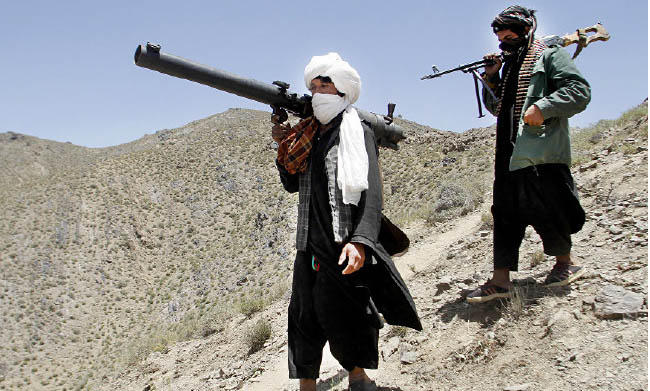Terrorist networks are most likely to intensify their attacks both in Afghanistan and Pakistan despite strong operations being carried out against them. Although the IS group has lost ground in Iraq and Syria and its leader was reportedly killed – which is not confirmed yet – it still seeks to extend its reach and recruits new soldiers in Afghan-Pak soils. The Monday attack on Iraq’s embassy in Afghanistan was also claimed by IS group.
The Taliban insurgents have intensified their attacks in Afghanistan, including the capital Kabul, within recent months which led to heavy civilian casualties. Their ideologue leader Mullah Haibatullah and his radical deputy Sirajuddin Haqqani – the head of Haqqani network – are caught in a time warp in spite of the fact that Kabul government repeatedly called them for peace negotiation. The two leaders – the Taliban and Haqqani group – operate in tandem to put pressure on Afghan-Pak governments. What is highly painful is that civilians bear the brunt of terrorist activities since the militants show no respect to the international humanitarian law (IHL).
Pakistani officials claimed that they had destroyed the sanctuaries of the outlawed Tehreek-i-Taliban Pakistan (TTP) in Karachi. Contrary to this statement, reports say that the banned outfit is seeking to re-establish its financial network in the city so as to strengthen its capability to launch terrorist attacks. Pakistan’s Counter Terrorism Department (CTD) has said, “The TTP was most likely to focus on re-establishing their financial support networks in Karachi and rebuilding the capability to launch large-scale attacks on public places or security forces.”
Similarly, the officials added that Lashkar-e-Jhangavi (LJ) was seriously weakened in Karachi, but this is still a matter of doubt. LJ is increasing its activities mainly in Sindh province with the support of the IS group. “While their ability to conduct large attacks has been mitigated, LJ retains a large support network and cadres in Karachi, who are most likely to either merge with other groups, such as IS, or create independent splinter cells to conduct targeted killings,” Pakistan’s CTD is cited as saying.
The IS lacked a “formal structure” in Pakistan’s soil claimed the security officials, but reports said that it was operating in some parts of Sindh with the help of sectarian outfits and reportedly attracted “educated militants” of Karachi. The Pakistani security officials assessed that the recent emergence of Ansarul Sharia Pakistan in Karachi – the outfit which was involved in a number of attacks targeting a former army official and several policemen – posed a serious threat to law enforcers.
Likewise, the recent suicide attacks carried out by the Taliban and IS group in Afghanistan inflicted heavy casualties upon combatants and non-combatants alike. A report released by UN Assistance Mission in Afghanistan (UNAMA) said that 1,662 civilians were killed and more than 3,500 wounded with deaths in the capital Kabul accounting for nearly 20 per cent of the toll in the first half of the year. Based on the report, the majority of the victims were killed by anti-government forces, including the Taliban militants and in attacks claimed by IS group.
The explosion of the truck bomb in late May in Kabul, which killed and wounded hundreds of people, was the deadliest incident to hit the country since 2001. The report added that a total of 174 women were killed and 462 wounded, an overall rise in casualties of 23 per cent on last year, while 436 children were killed in the same period, representing a nine per cent increase.
“The statistics in this report, horrifying though they are, can never fully convey the sheer human suffering of the people of Afghanistan,” UN High Commissioner for Human Rights Zeid Ra’ad Al Hussein is quoted as saying. “Many Afghan civilians are suffering psychological trauma, having lost family and friends, and are living in fear knowing the risks they face as they go about their daily lives.”
Considering the aforementioned issues, the cycle of civilian casualties never stops since terrorist networks continue their attacks without respect to human rights or humanitarian law. They show no tendency towards peace talks, either.
Afghanistan and Pakistan which are beset by terrorism for years need to be on friendly terms with each other so as to minimize the persistent threats posed by terrorist networks which intend to strengthen their ideological loyalties to one another. For instance, notwithstanding losing grounds in Syria and Iraq, the IS insurgents recruit soldiers in Afghanistan, Pakistan, etc. hunting for establishing strongholds in the two countries.
It is a highly serious issue to see that the IS group baptizes naïve individuals in tribal belts and urges for their allegiance in one way or another. It is an unmistakable fact that ideological parties do not only fight but also incubate through spreading their ideology.
To sum up, besides combating terrorism, the Kabul and Islamabad governments will have to stem the rising tide of terrorists’ ideology and false preaching in order to mitigate the insurgency.
Home » Opinion » Terrorism – A Serious Threat to Afghanistan and Pakistan
Terrorism – A Serious Threat to Afghanistan and Pakistan
| Hujjatullah Zia

